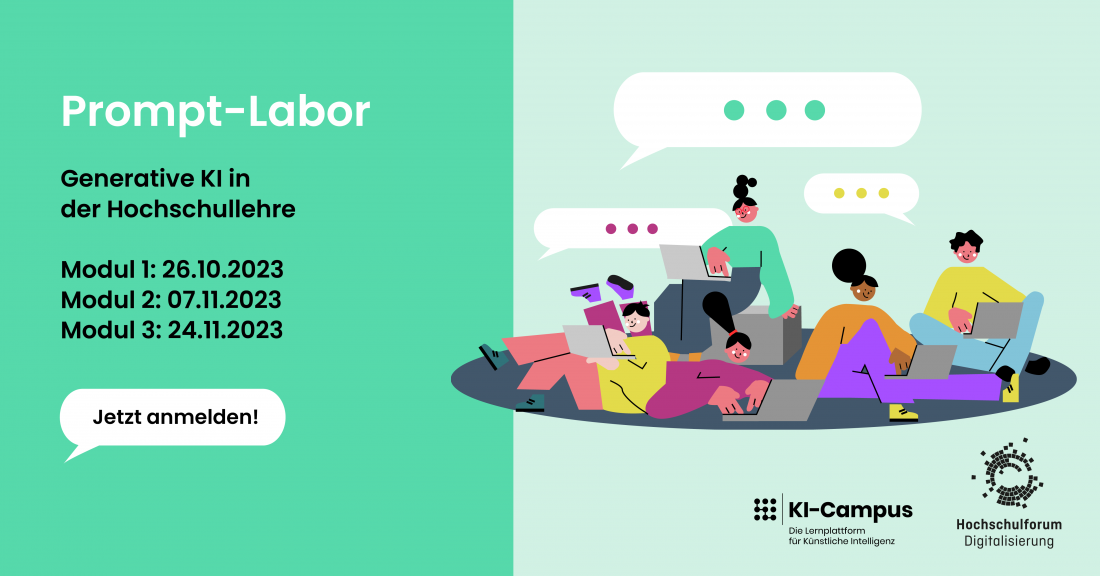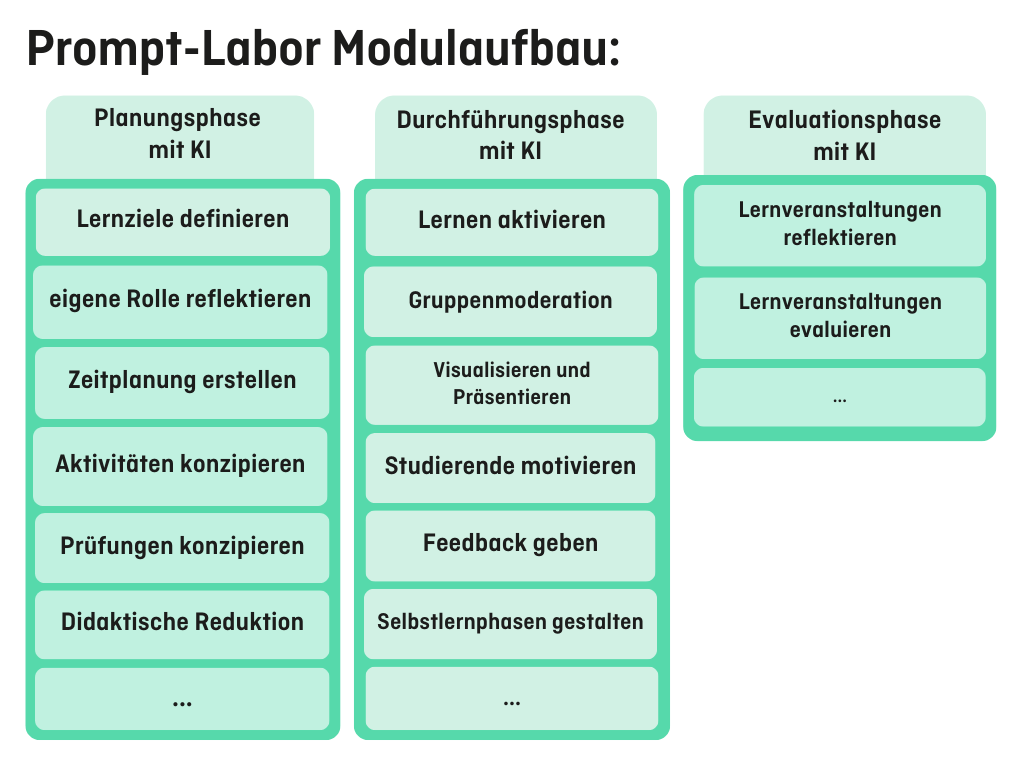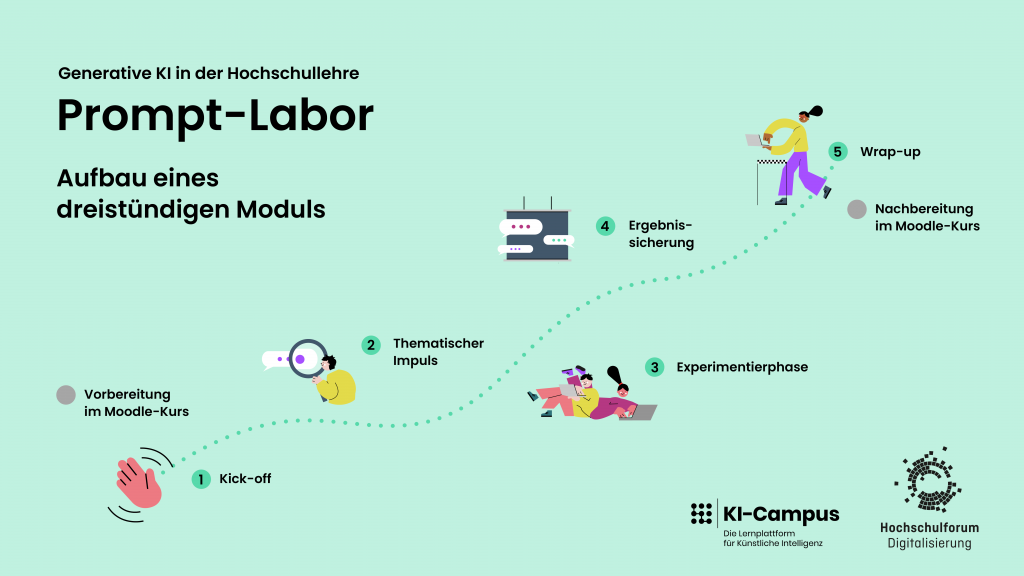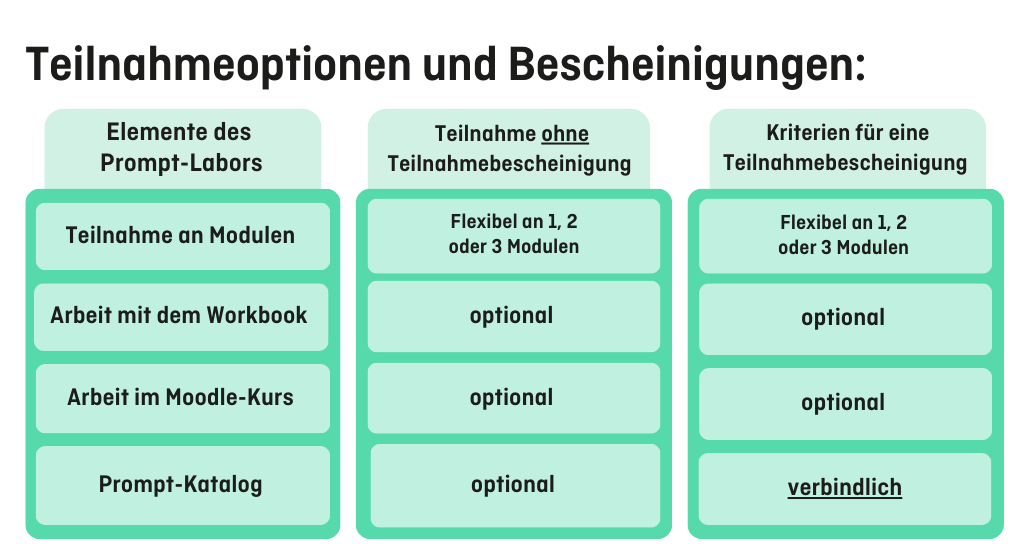Prompt Lab – Generative AI in University Teaching
The rapid pace of development in generative AI has both raised concerns and revealed promising opportunities in education. It is of great importance to test, reflect and optimize the targeted use of this technology in teaching. A key skill is being able to write effective instructional commands – also known as prompts.

In cooperation with experts, the Hochschulforum Digitalisierung (HFD) and the AI Campus offer the “Prompt Lab”, an extensive experimental space for university members. This community-based project primarily enables teachers to gain practical experience, discuss their own application scenarios for generative language AIs with peers, and develop these further. Proven prompts for higher education teaching will be sustainably documented in an OER prompt catalog and shared with the higher education community. The Prompt Lab takes place as a digital event with an accompanying Moodle course in three modules.
Exit situation
Generative AI has been causing disruption in education for a few months now, especially with the availability of large-scale language models (LLM). Recognizably, the introduction of innovative AI writing tools such as ChatGPT raises a variety of concerns in education. At the same time, a wide range of opportunities are opening up for using AI profitably and creating supportive learning environments. This is because new AI tools are not only capable of generating text, but can perform a wide range of language-related tasks, such as creating personalized curricula and real-time feedback.
In a short period of time, numerous stakeholders at all levels of education have been intensively studying the fundamentals of generative AI and language models such as GPT. At the same time, it became clear in the public discourse that their targeted use in university teaching must continue to be extensively tested and tried out.
Current demand
Numerous pioneers are already giving valuable advice on the successful use of AI technology in teaching and learning. In the process, it becomes clear that there is no single silver bullet. Teachers can only make good use of the potential of generative AI if they themselves gain basic experience with AI writing tools and work on their own application scenarios.
In order to develop a comprehensive understanding of how generative AI can be used in teaching, it is necessary to initiate a phase of intensive experimentation and trial and error within the (subject) communities. Experts emphasize that the creation of effective prompts is a key skill for better assessing and optimizing the benefits of AI in educational processes. This is where the offer of the Hochschulforum Digitalisierung and the AI Campus comes in: Teachers can not only acquire knowledge about AI, but also expand and pass on their practical skills in the field of prompting.
What is “Prompting”?
When interacting with a chat-based text AI, you make requests (also called prompts). If the result is not satisfactory, the query is optimized or supplemented. In dialogic exchange with the AI system, an ever better result is thus gradually created.
This iterative approach is necessary to generate goal-oriented outputs. How good the result is may depend, for example, on the order of queries, stylistic specifications, and structuring instructions.
The acquisition and further development of successful formulation techniques, also known as prompt design or prompt engineering, are therefore of particular value.
Planning and design of courses in the prompt lab.
In the Prompt Lab, the focus is on planning, delivering, and evaluating a course with the help of AI text tools. Three modules are offered as part of the Prompt Lab, corresponding to the different phases of a course. The following table shows some topics that can be edited:

Learning objectives
The core idea in the Prompt Lab is that all participants work on their own questions on which they want to exchange ideas. In subject-based or cross-disciplinary learning communities (max. five people), they receive support and guidance to use AI tools to effectively design their courses. At the end of the prompt lab, participants will be able to:
- Understand the basic concepts and applications of prompts in higher education teaching.
- Reflect on the potentials and challenges of using generative AI and prompts in higher education.
- Apply and write effective instructional commands (prompts) to achieve specific task or teaching scenarios with AI support.
- Evaluate and optimize prompts to improve the usefulness and quality of the teaching and learning content generated.
- Share experiences and best practices in using prompts with other instructors in the Prompt Lab learning community.
Target groups
The Prompt Lab is aimed at three target groups:
- Teachers, lecturers and tutors who are active in teaching. They can expand their knowledge of using generative AI and learn how to use these technologies to plan and design courses.
- Employees in support structures, such as university didactic centers. They will have the opportunity to expand their knowledge and skills in using generative AI to advise and assist instructors in integrating this technology into their courses.
- Academic managers, such as deans of studies, program directors or quality officers. You can learn to understand the potential of generative AI in practice in the prompt lab to improve the quality of courses and optimize the learning experience of students.
Establishment of the “Prompt Laboratory for University Teaching
The prompt lab takes place completely digitally and consists of the following elements, which can be combined flexibly.
1. asynchronous preparation and follow-up
Timely before and after the live sessions, pre- and post-course materials will be released in a Moodle course on AI Campus. Registration on the AI Campus is required to enroll in the course.
2. synchronous live sessions
The heart of each module is the live sessions. These last three hours (180 minutes) each and take place online (synchronously).
3. asynchronous further development of the prompt catalog
After each module, participants have the opportunity to further develop and publish the “Prompts for University Teaching” in the Moodle course on AI Campus.
Schedule of live sessions in the prompt lab
- a. Kick-off in plenary: At the beginning, the participants receive information about the process and are divided into learning communities (max. 5 persons).
- b. Thematic impulse: Each module starts with an impulse by an expert.
- c. Experimentation phase: In the break-out rooms, participants discuss their scenarios and develop their prompt design.
- d. Securing results and learnings
- e. Wrap-up

Dates for the live sessions
Module 1: Planning Phase (PD Dr. Malte Persike) – October 26, 2023 (10:00 to 13:00)
Module 2: Implementation Phase (Dr. Anika Limburg) – November 07, 2023 (10:00 to 13:00).
Module 3: Evaluation Phase (Natalie Sontopski) – November 24, 2023 (10:00 am to 1:00 pm).
Online registration was possible until 08 October.
Prompt Catalog
Proven prompts are carefully documented and made available to the community to offer helpful suggestions and good practices to faculty and staff. The open prompt catalog can also be used beyond lab appointments to share and publish ideas and best practices related to AI use in higher education.
Workload
- A total of 10.5 hours or 14 units of work (UW) are scheduled for participation in the three-module prompt lab.
- Preparation and wrap-up in Moodle course (3*30 min. = 1.5 hrs.)
- Three modules of three hours each (3*3 hrs. = 9 hrs.)
Participation options and certificates
The Prompt Lab offers a high degree of flexibility and allows for various participation options:
- Participants can enroll (depending on individual needs and interests) for 1-3 modules in the Prompt Lab.
- All participants will receive a workbook for the prompt lab, which will be used to structure the process and procedure in the working groups of the live sessions.
- All participants will receive access to accompanying course materials through AI Campus.
- Participation in the creation of the prompt catalog is optional.
- A certificate of attendance can be issued in the Moodle course.
- The certificate of attendance can also be used to earn up to 10.5 ePoints in HFDcert. HFDcert is the HFD Community Certificate, through which activities and competencies in digital teaching and learning can be recognized by the community and documented in an online portfolio. All information about recognition on HFDcert can be found here.


